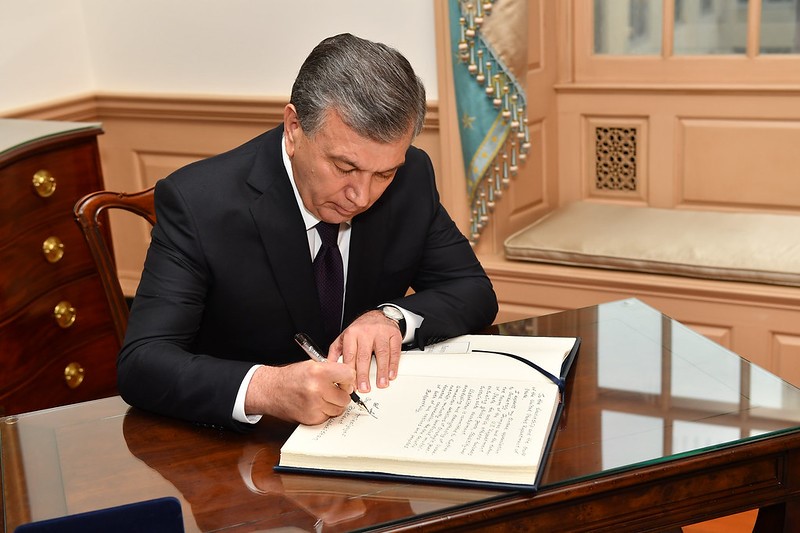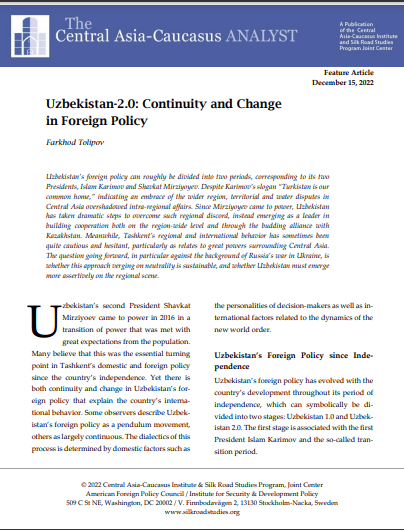Uzbekistan-2.0: Continuity and Change in Foreign Policy
By Farkhod Tolipov
December 15, 2022
Uzbekistan’s foreign policy can roughly be divided into two periods, corresponding to its two Presidents, Islam Karimov and Shavkat Mirziyoyev. Despite Karimov’s slogan “Turkistan is our common home,” indicating an embrace of the wider region, territorial and water disputes in Central Asia overshadowed intra-regional affairs. Since Mirziyoyev came to power, Uzbekistan has taken dramatic steps to overcome such regional discord, instead emerging as a leader in building cooperation both on the region-wide level and through the budding alliance with Kazakhstan. Meanwhile, Tashkent’s regional and international behavior has sometimes been quite cautious and hesitant, particularly as relates to great powers surrounding Central Asia. The question going forward, in particular against the background of Russia’s war in Ukraine, is whether this approach verging on neutrality is sustainable, and whether Uzbekistan must emerge more assertively on the regional scene.
From Tamerlane to Alexander the Great: Uzbekistan’s Evolving National Narrative
By Dmitry Shlapentokh
November 3, 2020, the CACI Analyst
After the death of President Islam Karimov, Uzbekistan’s new leadership has engaged in a transformation process structurally similar to those in the post-Stalinist USSR and post-Maoist China. Manifestations of this new reality are manifold. Some are quite visible to the public, such as the recent harsh jail term for Karimov’s daughter, accused of corruption, embezzlement, money laundering and other crimes. Other manifestations are more subtle, yet important in order to understand the new trends. In particular, a shift is underway from the emphasis of Tamerlane (Timur) as the founder of Uzbekistan to the role of Alexander the Great in the country’s antecedents.

Uzbekistan between a new president and the same nation: is it perestroika?
By Farkhod Tolipov
January 10th, 2017, The CACI Analyst
On December 4, 2016, three months after the death of Uzbekistan’s first President Islam Karimov, the country held new presidential elections. The Prime Minister and acting Interim President Shavkat Mirziyoev became president-elect by defeating three competitors in a highly asymmetric campaign characterized by the utilization of so-called administrative resources. Yet Mirziyoev’s campaign was also an explicit demonstration of new domestic and foreign political trends in post-Karimov Uzbekistan towards more liberal reforms. The campaign also revealed rising new expectations on the part of the Uzbek nation after a quarter-century of one-person rule.
Uzbekistan-Tajikistan: game over, but what is the score?
By Farkhod Tolipov
December 15th, 2016, The CACI Analyst
Uzbekistan’s and Tajikistan’s independence in 1991 raised the Shakespearean “To be or not to be?” question concerning the ambitious construction of a dam on the mountainous Vakhsh river in Tajikistan, which would embody the Rogun Hydro Power Station. Uzbekistan – a downstream country – has permanently and vigorously rejected and resisted the project referring to numerous risks associated with Rogun for all downstream countries. Uzbekistan’s president has been the principal political antagonist of this project. Two months after his death in September 2016, Tajikistan’s president has decided to move on with the project.
Uzbekistan and South Korea: towards a special relationship
By Mirzokhid Rakhimov and Sung Dong Ki
June 10th, 2016, The CACI Analyst
South Korea’s Prime Minister Hwang Kyo-ahn visited Uzbekistan on May 19-20, 2016. The visit was the fifteenth official high-level meeting between the two countries. Over the last year, several new actors have increased their engagement with Central Asia, aside from South Korea also including Japan and India. South Korea is an important partner to the Central Asian republics, and especially to Uzbekistan. In May 2015, Islam Karimov made Seoul the destination of his first foreign visit after his reelection as president. The visit underscored the priority given to South Korea in Uzbekistan’s foreign policy. South Korea is among the largest investors in Uzbekistan’s economy, and cooperation is growing in education, tourism, cultural exchanges, and security.






